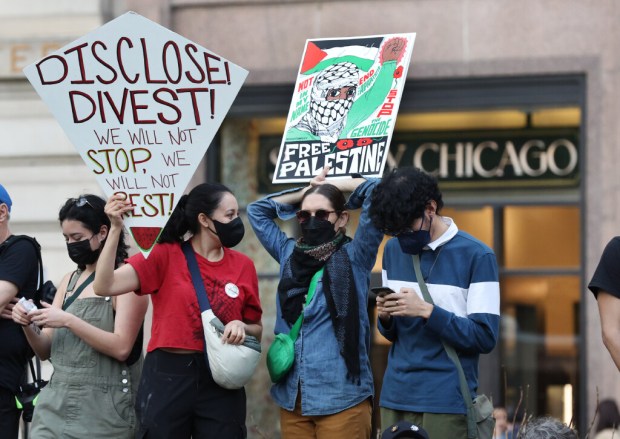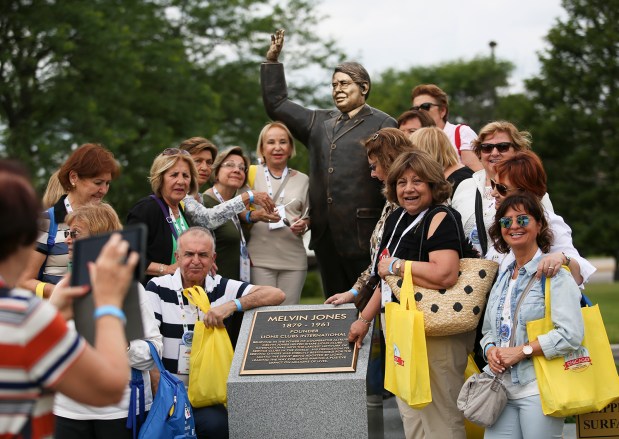Chicago police arrested about 50 pro-Palestinian protestors Saturday afternoon in North Garden at the Art Institute of Chicago in the Loop as unrest on college campuses across the country continued into the weekend.
Students at the School of the Art of Chicago set up a Pro-Palestine encampment in the garden around 11 a.m., filled with about a dozen tents, calling it “Hind’s Garden” in honor of a 6-year-old Palestinian girl killed by the Israeli military earlier this year. They wanted the school to disclose its investments and divest from companies and weapons manufacturers with ties to Israel.
By 4:30 p.m., around 50 people were inside the garden distributing food and setting up tents, while dozens stood outside a gate on the sidewalk by North Michigan Avenue, waving Palestine flags. Those outside the gate linked arms, attempting to prevent police from entering the garden, but were pushed back by cops.
Shortly after, cops entered the garden, breaking up the encampment by arresting protestors who had locked arms together. Some walked out of the garden with their hands up, while others were violently thrown to the ground, as people on the sidewalk chanted “Hands off our students.”
In a statement, police said they responded to the encampment to “maintain the safety of those participating” and those in the surrounding area. They negotiated with demonstrators for two hours, police said, including offering an alternative protest site. At 3:30 p.m., the Art Institute told them to take “enforcement action” to remove those in the garden, police said.
About an hour later, police said they arrested dozens of demonstrators for criminal trespass to property, clearing the area. The exact number of arrests wasn’t immediately available, a police spokesperson said.
A spokesperson for SAIC estimated about 50 people were arrested. The spokesperson said the Art Institute “respects a group’s right to peacefully protest without harming staff and visitors,” but claimed it grew disruptive, and that protestors shoved a security officer and stole their keys, blocked emergency exits and barricaded gates.
“Because our priority is the safety of our employees, our visitors, and our collection, protesters were offered an alternative location to continue their protest on campus that would be safer for all involved, and they did not accept that relocation offer,” the spokesperson said.
“During multiple rounds of negotiations, SAIC student protesters were promised amnesty from academic sanction and trespassing charges if they agreed to relocate. The School also agreed to meet with a student group to discuss their demands. After approximately five hours, an agreement could not be reached,” the statement continued.
A protester, who asked to go by his first initial J. for fear of retaliation, said the police response was unnecessary and made him “full of rage and disappointment,” especially after comments made Friday by Chicago police Superintendent Larry Snelling that reiterated support for free speech.
“I really hope that some serious accountability will be had in the future for that disconnect between what the city’s office says and what us as constituents of the city are experiencing,” J. said.
Mayor Brandon Johnson said Friday that protecting First Amendment rights is “paramount,” but that they will “assess all of these demonstrations.” Snelling said police would only go into encampments and remove people when necessary.
“What we’ll do is rely on the universities and the campuses to determine what needs to be done,” Snelling said.
As tent encampment encampments have popped up at universities throughout the country, many schools, including Columbia University in New York City, have called in law enforcement to douse demonstrations, leading to more than 2,400 arrests at 47 campuses nationwide and, at times, violent confrontations with police. Meanwhile, in rarer instances, other schools — including Northwestern University — have struck agreements with protest leaders to restrict the disruption to campus life and upcoming commencement ceremonies.
Meanwhile, at the University of Chicago, U.S. Rep. Jonathan Jackson and his father, Rev. Jesse Jackson Sr., joined protestors at the encampment, urging the school to peacefully resolve the demonstration in a Saturday visit, according to the school’s student newspaper.
The University of Chicago’s president, Paul Alivisatos, said Friday that the school was preparing to “intervene” to remove the pro-Palestine encampment from the school’s Main Quadrangle,though it remained intact as Saturday evening.
This student movement, seen as unlike any other this century, started in the past few weeks amid the mounting death toll in Gaza. More than 34,000 Palestinians have been killed, according to the Health Ministry.
Israel launched its war in Gaza after Hamas’ Oct. 7 attack on southern Israel, where the group killed some 1,200 people and took 250 hostages. President Joe Biden on Thursday defended the right to protest but insisted that “order must prevail” at college campuses, as some in Chicago’s Jewish community demanded action at local universities to prevent hate speech.
The Associated Press contributed reporting.




